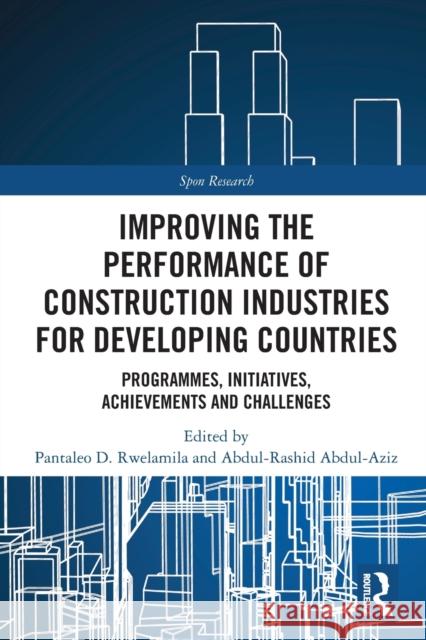Improving the Performance of Construction Industries for Developing Countries: Programmes, Initiatives, Achievements and Challenges » książka
Improving the Performance of Construction Industries for Developing Countries: Programmes, Initiatives, Achievements and Challenges
ISBN-13: 9780367652562 / Angielski
Improving the Performance of Construction Industries for Developing Countries: Programmes, Initiatives, Achievements and Challenges
ISBN-13: 9780367652562 / Angielski
(netto: 228,05 VAT: 5%)
Najniższa cena z 30 dni: 222,50
ok. 16-18 dni roboczych.
Darmowa dostawa!
This book documents the experiences, development, and prospects of the construction industry in numerous developing countries. It will provide a strong base of reference for countries looking to improve their construction industries as part of their wider economic development programme.The opening chapter presents a strategic overview of the contents of the book, and each country-specific chapter is structured to consider the legal and policy frameworks, administrative infrastructure and procedures, and implementation mechanisms, as well as the experiences, current activities, and future plans and programmes with respect to construction industry development in each country. The concluding chapter looks forward and considers the implications of future trends for the construction industries in developing countries and the actions which will be required to address them. Chapters cover: India, Singapore, Chile, South Africa, Tanzania, Malaysia, Botswana, Ghana, Uganda, Indonesia, China, Croatia, and Eswatini. Readers will learn about the wealth of comparable stories from global coverage from the detailed country-specific cases.Building on important scholarly works in the field, this book is essential reading for academics, researchers, and policy makers in built environments, economics, construction management, infrastructure management, and the wider construction industry.
This book documents the experiences, development, and prospects of the construction industry in numerous developing countries. It will provide a strong base of reference for countries looking to improve their construction industries as part of their wider economic development programme.
The opening chapter presents a strategic overview of the contents of the book, and each country-specific chapter is structured to consider the legal and policy frameworks, administrative infrastructure and procedures, and implementation mechanisms, as well as the experiences, current activities, and future plans and programmes with respect to construction industry development in each country. The concluding chapter looks forward and considers the implications of future trends for the construction industries in developing countries and the actions which will be required to address them. Chapters cover: India, Singapore, Chile, South Africa, Tanzania, Malaysia, Botswana, Ghana, Uganda, Indonesia, China, Croatia, and Eswatini. Readers will learn about the wealth of comparable stories from global coverage from the detailed country-specific cases.
Building on important scholarly works in the field, this book is essential reading for academics, researchers, and policy makers in built environments, economics, construction management, infrastructure management, and the wider construction industry.











